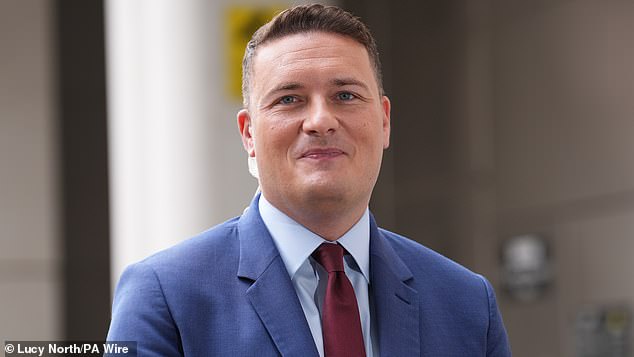Physician associates should be banned from seeing patients who have not been reviewed by a doctor to cut the risk of ‘catastrophic’ harm, a government-ordered review says.
Their job title should also be changed to physician assistant to reflect the fact they are supposed to support doctors rather than replace them, it adds.
More than 3,500 PAs work in the NHS and there have been previous calls for an expansion in their number.
But health secretary Wes Streeting ordered a review last November amid concerns they are being inappropriately used as substitutes for doctors, despite having significantly less training.
There have also been a number of high profile deaths of patients who had been misdiagnosed by PAs – sometimes unaware they had not seen a doctor.
Professor Gillian Leng, president of the Royal Society of Medicine, was commissioned to lead the review into the safety of the roles and how they can be effectively integrated into a multidisciplinary healthcare team.
Presenting her findings yesterday, she said she hopes her report will bring some ‘perspective’ to what has become a ‘heated debate’, with some doctors expressing fierce opposition to PAs.
Trainee doctors in particular are angry that PAs can earn more than them, work more sociable hours and take some of their training opportunities.

Professor Gillian Leng, president of the Royal Society of Medicine, was commissioned to lead the review
Professor Leng acknowledged PAs have been used to plug gaps on doctors’ rotas and called for major changes to how they work and are supervised.
This includes a requirement to work in a hospital for at least two years before being allowed to practice in a GP surgery or mental health trust and a need to have a named senior doctor as a line manager.
PAs must be clearly identifiable from a doctor, using ‘standardised measures’, such as national clothing, lanyards and name badges, she added.
But Professor Leng also called for their scope of practice to be widened with some PAs allowed to prescribe medicines, order MRI scans and train to become more highly paid ‘advanced’ PAs.
She said: ‘Crucially I’m recommending that PAs should not see undifferentiated or untriaged patients.
‘If (patients) are triaged, they (PAs) should be able to see adult patients with minor ailments in line with relevant guidance from the Royal College of GPs.’
She said more detail was needed on which patients can be seen by PAs and national clinical protocols should be developed in this area.
She added: ‘Let’s be clear, (the role of PAs) is working well in some places, but there indeed has been some substitution and any substitution is clearly risky and confusing for patients.’

Health secretary Wes Streeting ordered the review last November
Professor Leng recommended PAs should be renamed ‘physician assistants’ to position them ‘as a supportive, complementary member of the medical team’, while the 100 anaesthesia associates (AAs) working in the NHS should be renamed ‘physician assistants in anaesthesia’.
Six patient deaths linked to contact with PAs have been recorded by coroners in England.
One high-profile death involved Emily Chesterton, 30, who died from a pulmonary embolism. She was misdiagnosed by a PA on two occasions and told she had anxiety.
The Leng Review said safety concerns in relation to PAs were ‘almost always about making a diagnosis and deciding the initial treatment, particularly in primary care or the emergency department, where patients first present with new symptoms’.
It added: ‘It is here that the risk of missing an unusual disease or condition is highest, and where the more extensive training of doctors across a breadth of specialties is important.
‘Making the wrong initial diagnosis and putting patients on an inappropriate pathway can be catastrophic.’
Despite the shorter two years of training for PAs, where local NHS services have struggled with filling roles, ‘the easy option in some cases was simply to fill gaps in medical rotas with PAs’, the report went on.
‘This seems to have been done without taking into account the more limited training of the PAs and how the roles would interact, other than with the caveat that they would be supervised by doctors.

Brendan and Marion Chesterton, parents of Emily, who died after being misdiagnosed by a PA
‘This lack of planning may have been responsible for driving the resentment felt by some resident (doctors) and potentially exposed patients to unnecessary risk.’
When it comes to the safety of PAs and AAs, Professor Leng said the ‘evidence is poor’, with ‘no compelling evidence’ in published research ‘that PAs were safe to work as doctor substitutes in primary care’.
She also said the evidence was poor when it came to cost effectiveness.
When it came to AAs, there were questions over whether the role was actually needed as fully qualified anaesthetists already face tough competition to find a job.
Professor Leng, who spoke to around 1,000 people, concluded: ‘I could be absolutely clear that the roles are not so unsafe that they have to be discontinued, but neither does the evidence support proceeding with no change.’
PAs only have to complete a two year postgraduate course, rather than a medical degree.
Some PA courses let students join after studying geography, human resources or English literature.
Dr Tom Dolphin, chair of BMA council, said the review ‘laid bare the catastrophic failures in NHS leadership that have put patients at serious risk of harm” but said its recommendations “do not adequately protect patients’.

Dr Tom Dolphin, chair of the British Medical Association’s governing council
‘A major opportunity has been missed to end the postcode lottery of what PAs can and can’t do,’ Dr Dolphin added.
‘By failing to recommend authoritative, nationally-agreed scopes of practice, Professor Leng has ignored the most urgent demand of the medical profession, and left patients at the mercy of local decisions by employers who can still choose where and how assistants can work.’
Dr Dolphin also urged the Government and employers “not to waste any time” in renaming PAs ‘physician assistants’, as recommended by the review.
The government is expected to respond to the review in a written ministerial statement to Parliament today.












